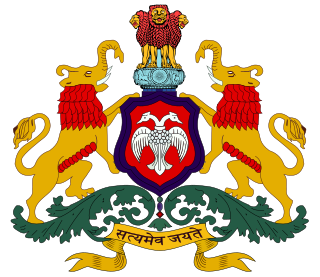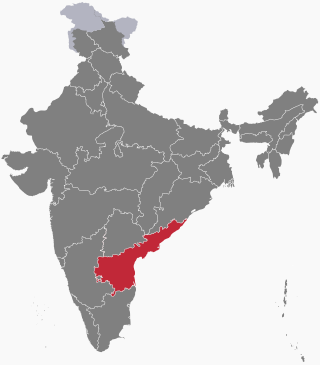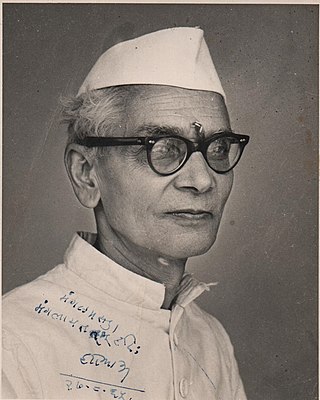Related Research Articles

The Lok Sabha, also known as the House of the People, is the lower house of India's bicameral Parliament, with the upper house being the Rajya Sabha. Members of the Lok Sabha are elected by an adult universal suffrage and a first-past-the-post system to represent their respective constituencies, and they hold their seats for five years or until the body is dissolved by the president on the advice of the council of ministers. The house meets in the Lok Sabha Chambers of the Parliament House, New Delhi.

Vasundhara Raje Scindia is an Indian politician, who has held two terms as the chief minister of Rajasthan. She was previously a minister in the Union Cabinet of Atal Bihari Vajpayee and was India's first Minister of Small Scale Industries and Agro and Rural Industries, now known as Micro, Small and Medium Enterprises. In 2003, she became the first woman to serve as the Chief Minister for the state of Rajasthan. She is currently one of the national vice presidents of the Bharatiya Janata Party (BJP). A member of the Scindia family, she is also the matriarch of the Bamraulia family of Dholpur.

Captain Sachin Rajesh Pilot is an Indian politician. A member of the Indian National Congress, he has been serving as Member of Rajasthan Legislative Assembly from Tonk since 2018. He has previously served as Minister of State of Corporate Affairs and Communication and IT in the Government of India under Manmohan Singh. Additionally he served as the Deputy Chief Minister of Rajasthan from 2018 to 2020 under Ashok Gehlot. Pilot became the youngest citizen of India to become Member of Parliament at the age of 26.

Ajmer Lok Sabha constituency is one of the 25 Lok Sabha (parliamentary) constituencies in Rajasthan state in India.

The Karnataka Legislative Assembly is the lower house of the bicameral legislature of the southern Indian state of Karnataka. Karnataka is one of the six states in India where the state legislature is bicameral, comprising two houses: the Vidhan Sabha and the Vidhan Parishad .

The Central Legislative Assembly was the lower house of the Imperial Legislative Council, the legislature of British India. It was created by the Government of India Act 1919, implementing the Montagu–Chelmsford Reforms. It was also sometimes called the Indian Legislative Assembly and the Imperial Legislative Assembly. The Council of State was the upper house of the legislature for India.

The first legislative assembly Election to the Madras state based on universal adult suffrage was held in 27 March 1952. This was the first election held in Madras state after the Indian Independence. This election was officially known as the 1951 Madras State Election, even though through delays, actual voting didn't take place until early 1952.

Elections in Andhra Pradesh are conducted in accordance with the Constitution of India. The Assembly of Andhra Pradesh creates laws regarding the conduct of local body elections unilaterally while any changes by the state legislature to the conduct of state level elections need to be approved by the Parliament of India. In addition, the state legislature may be dismissed by the Parliament according to Article 356 of the Indian Constitution and President's rule may be imposed.

The Tamil Nadu Legislative Assembly is the unicameral legislature of the Indian state of Tamil Nadu. It has a strength of 234 members, all of whom are democratically elected using the first-past-the-post system. The presiding officer of the Assembly is the Speaker. The term of the Assembly is five years, unless dissolved earlier.

Om Birla is an Indian politician from Rajasthan. He is currently serving as the Speaker of the Lok Sabha since 19 June 2019, when he was re-elected for a second term in June 2024. He serves as a Member of Parliament, Lok Sabha from Kota constituency in Rajasthan since 2014. In 2024, he became the first person in twenty years to be re-elected as an MP to the lower house, after serving as the Speaker of the Lok Sabha, and also one of only two MPs to be appointed the speaker twice.

Elections to the Ajmer Legislative Assembly were held on 27 March 1952. 134 candidates competed for the 30 seats in the Assembly. This was the final election for the Ajmer Legislative Assembly: on 1 November 1956, under the provisions of the States Reorganisation Act, 1956, the Ajmer State was abolished and its constituencies were merged into Rajasthan.

The Rajasthan Legislative Assembly, also known as the Rajasthan Vidhan Sabha, is the unicameral legislature of the state of Rajasthan. It's a vital part of the state government, responsible for making and implementing laws.
Chiman Singh Bhati was an Indian politician. He was a prominent leader of the Rawat community. He served as pradhan of the Jawaja Panchayat Samiti. Chiman Singh hailed from Dadola village, in Circle Taragarh.
Elections in the Republic of India in 2018 included by-elections to the Lok Sabha, elections to the Rajya Sabha, elections to of eight states and numerous other by-elections to state legislative assemblies, councils and local bodies.

Nidemane Somana was an Indian politician and lawyer. He was an Indian National Congress leader in Coorg State and served as the Member of Parliament for the state in the first legislature after the independence of India.
Shobha Ram Kumawat was an Indian Independence activist and Politician from the Indian National Congress political party and was a Member of Parliament of the 1st Lok Sabha and 2nd Lok Sabha representing the Alwar Parliamentary Constituency in the Rajasthan state of India.
Morarji Desai became the Chief Minister of Bombay State on 21 April 1952, following the Indian National Congress' victory in 1952 Bombay Legislative Assembly election. He formed a nine-member ministry that continued till his resignation on 31 October 1956. Yashwantrao Chavan succeeded him as the head of government.
Jiba Kanta Gogoi was an Indian National Congress politician from Assam. He served as Speaker of the Assam Legislative Assembly and twice as minister in the Hiteswar Saikia’s cabinets.

The 1972 Punjab Legislative Assembly election was the sixth Vidhan Sabha election of the state. Indian National Congress emerged as the victorious party with 66 seats in the 104-seat legislature in the election. The Shiromani Akali Dal became the official opposition, holding 24 seats. On 30 April 1977, Assembly dissolved and president rule was imposed.
Rokkam Lakshmi Narasimham Dora was an Indian politician who served as the second Speaker of Andhra State Legislative Assembly from April 1955 to December 1956. He was elected as an MLA from Tekkali constituency for two terms — in 1952 as an independent and in 1955 as a Congress candidate.
References
- 1 2 3 G. C. Malhotra (2004). Cabinet Responsibility to Legislature: Motions of Confidence and No-confidence in Lok Sabha and State Legislatures. Lok Sabha Secretariat. p. 744. ISBN 978-81-200-0400-9.
- 1 2 3 C. K. Jain; India. Parliament. Lok Sabha. Secretariat (1993). The Union and State legislatures in India. Allied Publishers. p. 687. ISBN 978-81-7023-339-8.
- ↑ Election Commission of India. Ajmer, 1951
- ↑ Election Commission of India. Bye-election results 1952-95
- ↑ Indian Press Digests. Bureau of International Relations of the Department of Political Science, University of California. 1951. p. 211.
- ↑ T. V. Rama Rao; G. D. Binani (1954). India at a Glance: A Comprehensive Reference Book on India. Orient Longmans. p. 578.
- ↑ Sir Stanley Reed (1956). The Times of India Directory and Year Book Including Who's who. Times of India Press. p. 770.